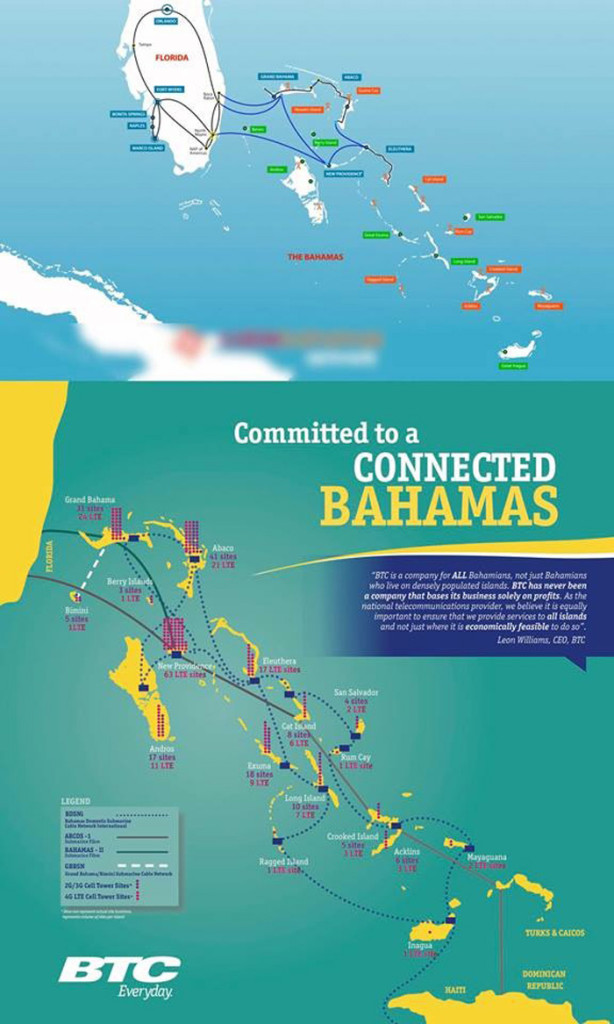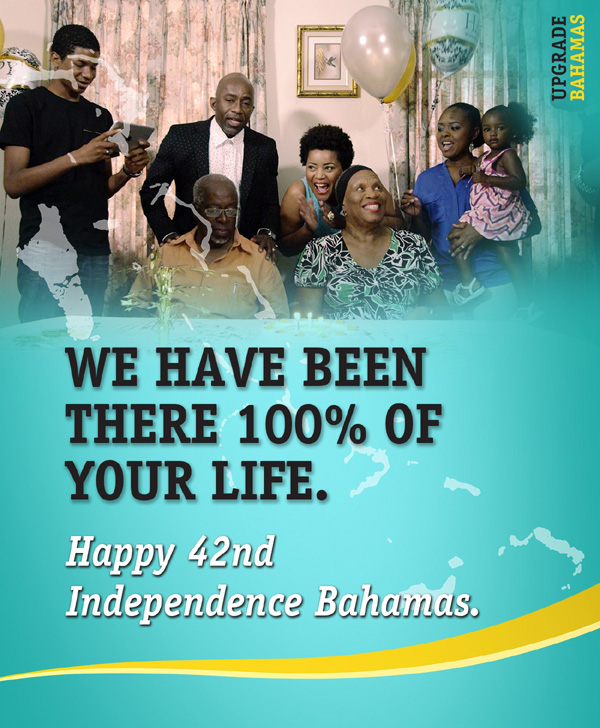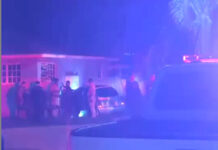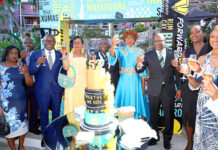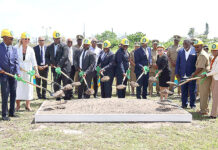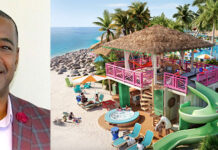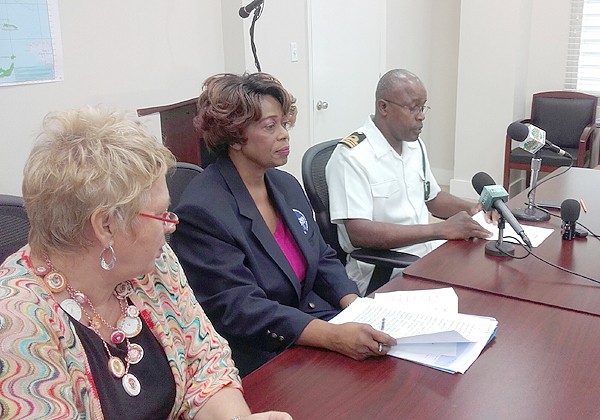
By the National Emergency Management Agency
NASSAU, The Bahamas -The Pan American Health Organization (PAHO) donates over $150,000 in relief aid, and the Royal Bahamas Defence Force continues to assist in a big way the residents impacted by the Category 4 Hurricane Joaquin, which struck the Central and Southeast Islands at the beginning of October.
During a press conference held Monday, October 19, 2015 at NEMA on Gladstone Road and NEMA’s Way, several of the Emergency Support Function grouping gave an update on the status of their particular area, as it relates to the overall relief effort.
Reporting were: Chrystal Glinton, First Assistant Secretary, NEMA; Lt. Cmdr. Frederick Brown, Royal Bahamas Defence Force; and Dr. Gerry Eijkemans
PAHO/WHO Representative for The Bahamas & Turks and Caicos Islands.
Chrystal Glinton, First Assistant Secretary at NEMA said that due to the vulnerability and hazardous conditions on the islands, NEMA is still in the relief and response phase.
“NEMA continues to send food and water, in addition to tarpaulin, tents, cots and blankets (to those displaced by the storm). Personnel on the ground are Family Island Administrators (additional support was sent from the Ministry of Local Government to Crooked Island and Long Island to assist administrators on those islands), the Royal Bahamas Defence Force, the Department of Social Services, the Department of Environmental Health Services and the Department of Health.
Also, Tropical Shipping, the Nassau Container Port, Bahamas Red Cross, Bahamas Fast Ferries, Head-Knowles, the Bahamas Chamber of Commerce, Rotary Clubs, Abaco Shipping, Mediterranean Shipping continue to assist with the coordination of donated goods and supplies.
Residents in the affected islands are reminded to apply for duty exemption – to replace goods and items destroyed during the hurricane. Forms are available online at www.bahamas.gov.bs, at NEMA’s office on Gladstone Road and NEMA’s Way, and the Help Desk at the Department of Rehabilitative Services on Thompson Boulevard.
The Department of Social Services is also offering counselling services to victims of the hurricane; they can sign in at the Help Desk.
Special thanks to Rupert Roberts of Super Value who accommodated NEMA in its request for food items on Saturday, October 3.
ROYAL BAHAMAS DEFENCE FORCE: Impact Teams
As of 15 October the RBDF have deployed additional manpower to all of the affected Islands to assist with initial and ongoing damage assessment, together with relief and restoration work. However activity on the ground includes but is not limited to:
· Clearing of main supply routes such as primary and secondary roads ways, airport runways, docking facilities and channels.
· Restoration of Critical Infrastructure such as medical clinics, Pharmacies generators houses, local water supply, Police Stations, warehouses, food stores and the cleanup of other Government buildings.
· Receiving, storage and security issuing of hurricane relief supplies.
· Ongoing damage assessments.
· Minor repairs to homes, particularly roofs, doors and window damage.
· The clearing of government buildings of debris and other hazards.
· Provision of security for distribution sites of hurricane supplies.
ARAWAK CAY PORT TEAMS
Activities:
· Responsible for receiving, storing and securing local and international donations for onward transmission to affected areas.
MISSIONS
Multiple missions have been conducted in conjunction with NGO’s to facilitate the following:
· Transportation (air/sea lift) of hurricane supplies to affected islands.
· Evacuation of displaced and sick residents from the affected islands.
· Deployment of manpower to affected islands to assist Island leadership (Administrator etc.) with damage assessments and initial relief efforts.
· Assist with the procurement of flights for government officials and other professionals to the affected islands. Many thanks to Mr. Paul Aranah (CEO Trans Island Airways) and his team of professional pilots for providing airlift for RBDF and other Government agencies gratis for some two-and-a-half weeks.
Container City
Additional manpower has been deployed to Crooked Island with a Field Container City to effect relief and restoration efforts to Acklins Island as well.
The Container City comprises of the following components:
· Field Kitchen
· Field Hospital
· Office Spaces
· Barrack Spaces
· Generators
· Reverse Osmosis system that can produce up to 10,000 gal of potable water per day
· Utility/hazard management bay.
These core field elements will ensure prolonged, sustainable relief and restoration efforts for RBDF/local communities while on the ground in Crooked and Acklins Islands.
Similarly, and not counting (RBDF) deployment of ships companies, the RBDF have deployed – in rotation – more than 150 Marines to affected areas.
PAN AMERICAN HEALTH ORGANIZATION PAHO/WHO
Hurricane Joaquin delivered a significant blow to the residents in the Central and Southern Bahamas. The support they need from a public health perspective is far from over.
Recognizing the immediate need to support these communities, the Pan American Health Organization/World Health Organization (PAHO/WHO) country office for The Bahamas and the Turks and Caicos Islands prioritized its resources, commitment and support to the Ministry of Health & Ministry of Environment and Housing recovery efforts.
As the only resident United Nations Agency in the country, PAHO/WHO is in a strategic position to deploy a high caliber team of disaster management experts – including the PAHO Regional Advisor for Emergency Preparedness and Disaster Relief, a sanitary engineer, a structural engineer, a biomedical engineer, disaster risk reduction specialist, and a logistics expert – to rapidly assess the heavily damaged islands in the Central and Southeast Bahamas.
The PAHO/WHO Regional Response Team supported in-country disaster relief in coordination with the Ministry of Health and Ministry of Environment and Housing.
The goal of the team’s rapid assessment was to:
1. Identify key areas to ensure immediate relief and access to health care to the 5000+ residents impacted by Hurricane Joaquin.
2. Identify long term solutions to support the full recovery, rebuilding and restoration of health services to residents in the Central and Southern Bahamas.
3. Identify main public health risk, immediate and future.
Between October 4th and October 8th, the PAHO/WHO Regional Response Team assessed Long Island, Crooked Island and Acklins. The key areas of focus were to assess:
· Damage to health centers/clinics;
· Water and sanitation issues;
· Vector control issues and;
· Mental health support on these islands.
The rapid assessment indicated that two clinics are completely destroyed, and many other clinics are damaged. Emergency repairs are needed to ensure continuity of access to health care.
To support immediate access to health services, PAHO/WHO pledged:
· 3 large, 15kw generators to the main affected clinics;
· Fuel drums and hand-held (manual) diesel pumps for easy generator refueling;
· Refrigeration (cooling units) to ensure proper supply of vaccines and essential medicines; and,
· 10 iridium satellite phones to support communication between the health facilities
Water, sanitation and hygiene
Large bodies of standing water generate significant concerns around issues of water, sanitation and vector control. PAHO/WHO supports the government in ensuring that strong public health measures are taken to keep mosquito and rodent populations under control and to prevent any outbreaks due to water and sanitation issues.
Flooding has resulted in wells being contaminated with septic tank contents (fecal matter) and in some cases with seawater, and should not be used for consumption.
Bahamians in the impacted areas are advised to utilize bottled/drinking water exclusively for drinking, cooking and brushing teeth. The quality of well water can be improved for bathing, cleaning and other household tasks by using household (unscented) chlorine bleach. (For example: to disinfect 1 gallon of water use 2.5 teaspoons of bleach. To disinfect 50 gallons of water use half a gallon of bleach. Allow the bleach and water solution to stand for 30 minutes before use).
Disinfecting well water still does not make it suitable for drinking. Aqua tabs and chlorine were sourced by PAHO to assist the Department of Environmental Health Services to ensure water supply can be restored.
Furthermore, key recommendations and public health messages were provided.
Lack of clean water can result in outbreaks of gastro-enteral diseases (diarrhea) or skin problems due to lack of hygiene. Affected residents are advised to seek medical attention when experiencing symptoms of particularly diarrheal diseases.
Ensuring all affected persons have access to sufficient and clean drinking water is essential. This should be a priority; measures need to go beyond business as usual. This is a great opportunity for public private partnerships to ensure everyone, independent of their means, has access to clean drinking water and should avoid using contaminated water.
Vector control efforts
PAHO/WHO supports vector control efforts and has supported the purchase of:
· Several handheld foggers and two truck mounted foggers to strengthen mosquito-fogging exercises on the affected islands
· Insect repellent
· Malathion (an insecticide)
· Larvacides to further control mosquito populations
PAHO/WHO advises the public to take the following normal precautions to avoid mosquito bites:
· Cover water storage tanks and containers and clear all items that contain rain water such as buckets, tires, or other containers that can store water;
· Burn mosquitos coils and utilize insect repellents (as directed); and,
· Wear longer clothing to avoid mosquito bites
Persons experiencing any symptoms that could indicate dengue or chikungunya to health staff (fevers, intense joint pains, pain around the eyes, vomiting, etc.) should seek medical advice in the nearest health center.
Furthermore, it is important to report increased incidents of rodent populations to the Department of Environmental Health Services.
Over the last days, teams from the Ministry of Health have provided necessary mental health support on the impacted islands. PAHO/WHO stands ready to support and has provided documentation to guide the efforts.
PAHO has donated over $150,000 to the assessment and recovery efforts and a report with recommendations has been handed over to the Government of The Bahamas. PAHO says it remains committed to supporting the Government in these difficult times.



